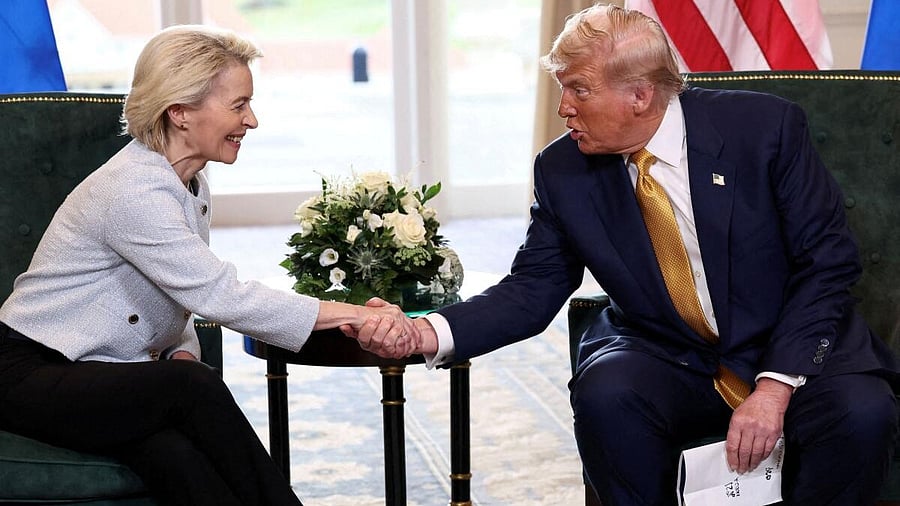
US President Donald Trump shakes hands with European Commission President Ursula von der Leyen, after an announcement of a trade deal between the US and EU, in Turnberry, Scotland, Britain.
London: European companies were left wondering on Monday whether to cheer a hard-won US trade deal or lament a still sharp jump in tariffs versus those in place before President Donald Trump's second term.
A day earlier, European leaders heralded a framework trade deal with the United States that would impose a 15 per cent import tariff on most EU goods, averting a spiralling battle between two allies which account for almost a third of global trade.
Although the deal is better than the 30 per cent rate threatened by Trump and will bring clarity for European makers of cars, planes and chemicals, the 15 per cent baseline tariff is well above initial hopes of a zero-for-zero agreement. It is also higher than the US import tariff rate last year of around 2.5 per cent.
"Those who expect a hurricane are grateful for a storm," said Wolfgang Große Entrup, head of the German Chemical Industry Association VCI, calling for more talks to reduce tariffs that he said were "too high" for Europe's chemical industry.
"Further escalation has been avoided. Nevertheless, the price is high for both sides. European exports are losing competitiveness. US customers are paying the tariffs."
The deal, which also includes $600 billion of EU investments in the United States and $750 billion of EU purchases of US energy over Trump's second term, includes some exemptions, even if details are still to be ironed out.
Carmakers Volkswagen and Stellantis, among others, will face the 15 per cent tariff, down from 25 per cent under the global levy imposed by Trump in April.
Stellantis shares rose 3.5 per cent and car parts maker Valeo was up 4.7 per cent in early trade. German pharma group Merck KGaA gained 2.9 per cent.
Aircraft and aircraft parts will be exempt - good news for French planemaker Airbus - as will certain chemicals, some generic drugs, semiconductor equipment, some farm products, natural resources and critical raw materials.
Shares in the world's biggest chip maker ASML rose more than 4 per cent, among the biggest gainers on the pan-European STOXX 600 index.
Still to be negotiated
Dutch brewer Heineken cheered the deal, with CEO Dolf van den Brink welcoming the certainty it brought.
The world's No.2 brewer sends beer, especially its namesake lager, to the US from Europe and Mexico, and has also suffered from the indirect effect on consumer confidence in important markets like Brazil.
The rate on spirits that could impact firms such as Diageo , Pernod Ricard and LVMH, is still being negotiated though.
"It seems that in coming days there could be negotiations for certain agricultural products, zero for zero, which is what the European and US sectors have been calling for," said Jose Luis Benitez, director of the Spanish Wine Federation. Benitez added that a 15 per cent rate could put Europe at a disadvantage versus other wine exporting regions subject to 10 per cent tariffs.
"If there are any exceptions, we hope that the (European) Commission understands that wine should be one of them."
Lamberto Frescobaldi, the president of Italian wine body UIV, said on Sunday that 15 per cent tariffs on wine would result in a loss of 317 million euros ($372.63 million) over the next 12 months, though the group was waiting to see the final deal text.
Others said that the agreement- which followed on the heels of a similar one with Japan - helped bring greater clarity for company leaders, but still threatened to make European firms less competitive.
"While this agreement puts an end to uncertainty, it poses a significant threat to the competitiveness of the French cosmetics industry," said Emmanuel Guichard, secretary general of French cosmetics association FEBEA, which counts L'Oreal , LVMH and Clarins among its members.